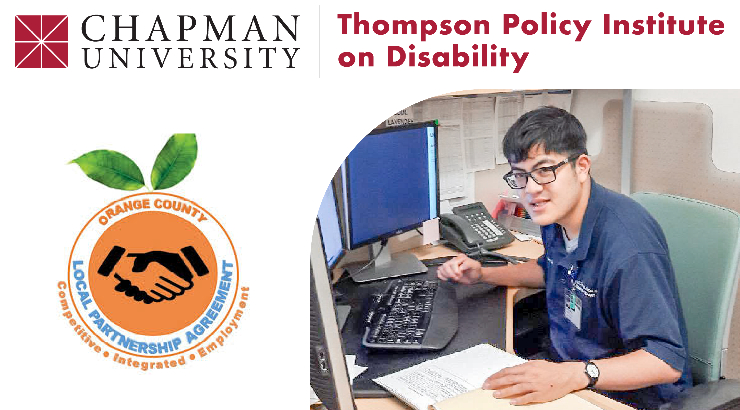
TPI Partners with OC Groups Toward a Brighter Future for People with Disabilities
February 8, 2022
Throughout California, the employment rate for individuals with intellectual and developmental disabilities (IDD) remains alarmingly low at 14.2%, when compared to the general population rate at 76.5% (Department of Developmental Services, 2016). The Thompson Policy Institute on Disability (TPI), in partnership with many service providers, agencies, K-12 and post-secondary education institutions, developed the Orange County Local Partnership Agreement (OCLPA) to work toward improving employment outcomes for youth and adults with disabilities.
The OCLPA is an integral part of TPI’s Transition Initiative, which strives to improve transition outcomes (e.g., employment, education, housing, social and emotional well-being) for people with a wide range of disabilities. The overall goal is to support individuals with disabilities (IWD) in leading happy, healthy, and productive lives. The OCLPA supports the mission of TPI’s Transition Initiative by forming a multi-agency steering committee with TPI, Regional Center of Orange County, Department of Rehabilitation, California Department of Education, education partners, service agencies, not–for-profits and advocacy organizations. OCLPA’s collaboration among agencies advances the preparation for and achievement of competitive integrated employment for youth and adults with disabilities. Richard Rosenberg, Ph.D., and Linda O’Neal, M.A., a critical part of TPI’s Transition team, are leading the multi-agency effort to improve transition outcomes for people with disabilities through serving on the OCLPA Steering Committee.
OCLPA’s efforts to improve transition outcomes include the launch of the TransitionCA.org website. The mission of the TransitionCA website is to promote and support successful transition to employment, education, independent living, and quality life for individuals with disabilities. The website supports transition by providing transition related information for a variety of stakeholders, including IWD, families, educators, adult service providers, agencies, advocacy groups, medical professionals, university researchers, and others. The OCLPA partner agencies provide information sheets, research articles, and videos to help stakeholders with post-secondary education, employment, independent living, and other transition related topics. TPI’s Undergraduate Tech Assistants – Loren Lee, Kaita Pannor, and Allaire Davis – supported the website design and uploaded over 2,000 documents. New documents are uploaded each month and the Transition Training Calendar is updated regularly with new events.
“This new and updated website is a national model and has been incredibly helpful for so many in OC and California,” shared Dr. Don Cardinal, Professor in Disability Studies at Chapman University.
The TransitionCA website highlights upcoming OCLPA webinars and hosts the recordings of past webinars. Recently, the OCLPA agencies organized a Conservatorships and Alternatives Panel virtual webinar. The Conservatorship and Alternatives Panel reflected a partnership with TPI, Regional Center of Orange County, Disability Rights California, and the State Council on Developmental Disabilities. The panel presentation discussed several viewpoints regarding conservatorship and alternatives from self-advocates, an attorney, parents, and service providers. The virtual presentation was attended by over 200 people and was made accessible with live closed captioning, ASL interpreter, Spanish translator, and Vietnamese translator. The recording of the panel presentation, along with supporting materials, is available on the TransitionCA website.
Future programming for OCLPA partner organizations will be informed through the collection of current program data, monitoring of program outcomes, and then reporting of research through the OCLPA. Specifically, competitive integrated employment and post-secondary education data will be gathered jointly with the Department of Developmental Services, Regional Center of Orange County, Interwork Institute at San Diego State University, California Department of Education, and Department of Rehabilitation. TPI will utilize a research team to compile and analyze the data from these multiple sources. The OCLPA will then set outcome measures and use the data to improve programming efforts.
The OCLPA will continue to work together to improve the transition outcomes for youth and adults with disabilities. The OCLPA has developed an action plan and goals to increase work-based learning and competitive integrated employment for individuals with a wide range of disabilities. This will be accomplished through expanding partnerships with businesses throughout Orange County. The relationships between self-advocates and businesses will be strengthened through career development, workforce development, and post-secondary education. OCLPA will also collaborate in the creation of best practices in work training and career development for IWD. The joint efforts of the OCLPA will support skill development and work experience opportunities to foster meaningful, purpose-driven work in adulthood for IWD to promote competitive integrated employment in chosen career pathways.